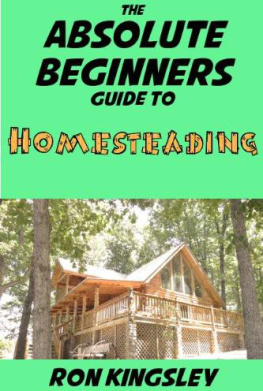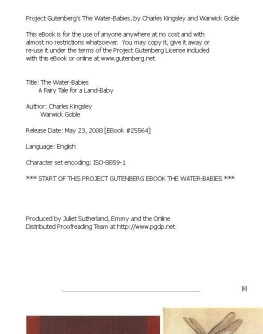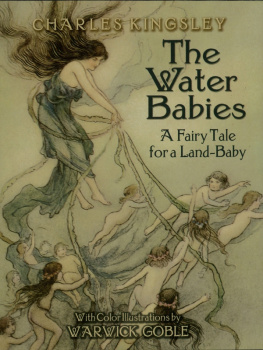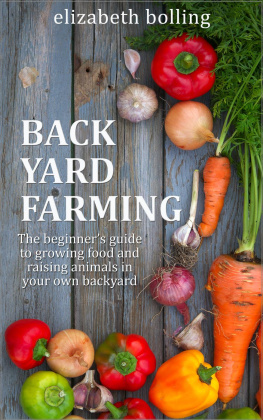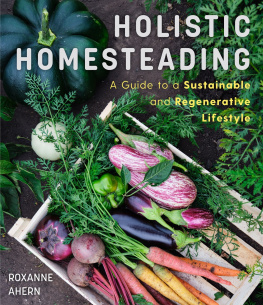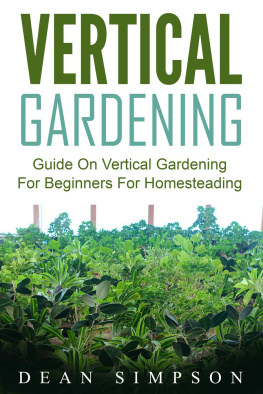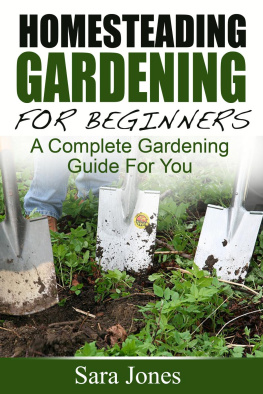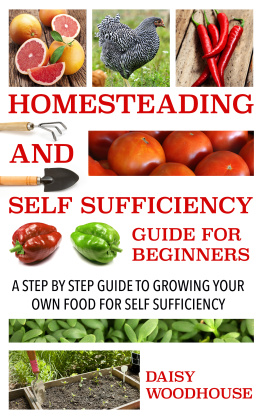Kingsley - The Absolute Beginners Guide to Homesteading
Here you can read online Kingsley - The Absolute Beginners Guide to Homesteading full text of the book (entire story) in english for free. Download pdf and epub, get meaning, cover and reviews about this ebook. year: 2013, genre: Children. Description of the work, (preface) as well as reviews are available. Best literature library LitArk.com created for fans of good reading and offers a wide selection of genres:
Romance novel
Science fiction
Adventure
Detective
Science
History
Home and family
Prose
Art
Politics
Computer
Non-fiction
Religion
Business
Children
Humor
Choose a favorite category and find really read worthwhile books. Enjoy immersion in the world of imagination, feel the emotions of the characters or learn something new for yourself, make an fascinating discovery.
The Absolute Beginners Guide to Homesteading: summary, description and annotation
We offer to read an annotation, description, summary or preface (depends on what the author of the book "The Absolute Beginners Guide to Homesteading" wrote himself). If you haven't found the necessary information about the book — write in the comments, we will try to find it.
The Absolute Beginners Guide to Homesteading is a vital first step on the path to preparing for the homesteading life. Multiple methods of home construction, food procurement, and energy production are discussed. Eco-friendly or green techniques are emphasized in this guide, but general non-green methods are also explained. If youre unsure how to start down the path to being a homesteader, look no further than The Absolute Beginners Guide to Homesteading.
Kingsley: author's other books
Who wrote The Absolute Beginners Guide to Homesteading? Find out the surname, the name of the author of the book and a list of all author's works by series.
The Absolute Beginners Guide to Homesteading — read online for free the complete book (whole text) full work
Below is the text of the book, divided by pages. System saving the place of the last page read, allows you to conveniently read the book "The Absolute Beginners Guide to Homesteading" online for free, without having to search again every time where you left off. Put a bookmark, and you can go to the page where you finished reading at any time.
Font size:
Interval:
Bookmark:
The Absolute Beginners Guide to Homesteading
by Ron Kingsley
2013
Table of Contents
IntroductionThere are differing views today about what exactly homesteading is. Generally it is agreed that it entails farming and being as self-sufficient as possible, particularly in terms of food. Some people feel that it also means being off the grid and/or eco-friendly and may require building your own home to be considered homesteading. Others disagree. For the purposes of this guide, we will try to take the middle ground on these points. We will look at energy production, building techniques and food production with an emphasis on being green, natural, and eco-friendly, while still aknowledging and demonstrating more eco-UNfriendly methods as well. Please keep in mind that this is an absolute beginners guide. A starting point for people looking to get their feet wet and determine which areas they need to research. For people who already posses a background knowledge on these topics, we are currently working on a much more detailed, advanced guide which will include wiring diagrams, schematics, blueprints and other such elements that may be overwhelming for beginners. So without further delay, let's dive right into the Absolute Beginner's Guide to Homesteading.
Chapter 1: Energy Production BasicsBefore going into the specific methods of energy production, let's briefly cover some basic principles of electrical energy. There are a number of ways in which electricity can be measured, which can be confusing to some people. Many people have never been informed as to the difference between Voltage, Wattage, and Amperage. All three are very important to measuring electricity, but will give you entirely different values from any given power source. Though in fact it is more complicated, the simplest way to conceptualize this is to think about electricity like the flow of water.
Thinking in these terms, Voltage, is the strength of the current. Or, for the sake of our analogy, how fast the water is moving. (Note, this is just an analogy, the speed of electricity does not actually change.) The Wattage is the amount of current, or, volume of water. And Amperage, is Voltage and Wattage combined and essentially tells us how much work a given electrical current can get done. Picture it like this, if the Amazon river with its massive volume of water (Wattage) was only moving at a speed (Voltage) of one inch per hour, it would exert very little force (Amperage) on an object that got in its way. However, if the speed (Voltage) was increased, the force (Amperage) would also increase. Of course, increasing the volume (Wattage) would also affect the amount of force (Amperage). In terms of electricity, the basic formula for determining amperage is, Watts divided by Volts. Understanding this, we can see how increasing or decreasing either Watts or Volts, will affect Amperage. In energy production, our goal is to produce as much Amperage as possible.
With home energy production, generally speaking, you will be producing 12Volts. This is not a constant, especially if building your own components, but virtually all commercial wind turbines, solar panels, etc, will produce 12Volts at varying Wattages. While this may seem small, consider that your energy needs to be stored in batteries. These batteries could be car batteries, marine batteries or other similar power cells. Charging those batteries with greater than 12-14Volts can be dangerous and even cause the batteries to explode. Having all of our green energy devices produce 12Volts, keeps everything far more safe and simple. So, being that we want to maintain a constant 12Volts, to maximize our Amperage, we want to produce the highest Wattage possible. How we do this, depends on the specific forms of energy we are utilizing. In the case of solar panels, all we can do is keep the panels clean and try to optimize the angle at which they face the sun. But there is more that we can do with other forms of energy.
Most forms of green energy (except solar and geothermal) have a few things in common. The most important of these, is that regardless of how, they spin an axle. That spinning axle will make up part of a magnetic coil. In some cases, the axle will have magnets mounted to it which spin in the middle of a large coil of magnetic wire. In other cases, it is reversed and a coil of magnetic wire spins on the axle with strong magnets mounted around it. In either case, the spinning motion is what actually produces energy. These spinning magnetic coils can come in many different forms but are collectively refered to as alternators. And yes, the alternator in your car is exactly the same thing. When it comes to alternators, the position, orientation, and sizes of both the magnets and the magnetic coils will affect the Voltage and Wattage produced. It will also affect the speed at which the axle needs to spin, and the amount of force (torque) needed to do so.
There are a number of approaches one can take in regards to energy production. Some are better than others. If your land is near a stream or river, a water wheel is a much better source of energy than wind or solar. Water wheels work in all weather. The flow of water, though sometimes seasonal, is generally constant unlike the wind or sunshine. Water wheels produce greater torque than windmills, and can therefore produce higher amperage with the correct gear ratio. What this means, is that even though you will generally have low RPM with a water wheel, it will have significantly more power (torque) than a wind turbine. Because of that extra torque, we can use gears (even the gears from a bicycle) to make the axle of our alternator spin much faster than the axle of the water wheel is spinning. Whereas doing this with a wind turbine creates problems since a breeze or light wind won't have enough force to turn the gears. And, water wheels are more rugged, as well as more easily repaired, than windmills or solar panels. The mechanical parts, aside from the bearings, can be made out of wood. In a pinch, the bearings too could be made of wood, but they would be less efficient.
Windmills and solar panels, on the other hand, require special parts and materials. However, if a source of running water is not available, wind and solar are both perfectly viable options, they just require you to be more careful about your energy consumption.
Often times, the best approach is a combination of energy sources. Wind and solar combined can produce a modest amount of power. If you do have the ability to use a water wheel, but the river or stream dries up in the summer, using all three energy sources can make up the difference. It is likely that your power consumption will be at its lowest during the summer months. Therefore, losing the additional hydro power during those months, should have little impact on you. Alternately, in winter months the added power from hydro can be a lifesaver. In sub-zero weather, be sure to check your water wheel at least twice a day (bring a hammer) and break up any ice that may be forming. Another thing to note about water power, is that with the high amount of torque, you have more options for the type of alternator you can use, regardless of gears. Windmills, generally lack the power to use a car alternator with any acceptable level of efficiency. For most models, the faster those alternators spin, the more torque it requires. Water wheels, on the other hand, are generally more than capable of spinning these alternators at high speeds with a simple gear mechanism. Car alternators do have some distinct advantages. They are quite weather resistant, and often much more durable than windmill alternators, and can produce very high amperage at relatively low rpm. Additionally, good condition alternators can often be found at auto wreckers, quite cheap. Much cheaper than the special green energy alternators available for sale.
Next pageFont size:
Interval:
Bookmark:
Similar books «The Absolute Beginners Guide to Homesteading»
Look at similar books to The Absolute Beginners Guide to Homesteading. We have selected literature similar in name and meaning in the hope of providing readers with more options to find new, interesting, not yet read works.
Discussion, reviews of the book The Absolute Beginners Guide to Homesteading and just readers' own opinions. Leave your comments, write what you think about the work, its meaning or the main characters. Specify what exactly you liked and what you didn't like, and why you think so.

